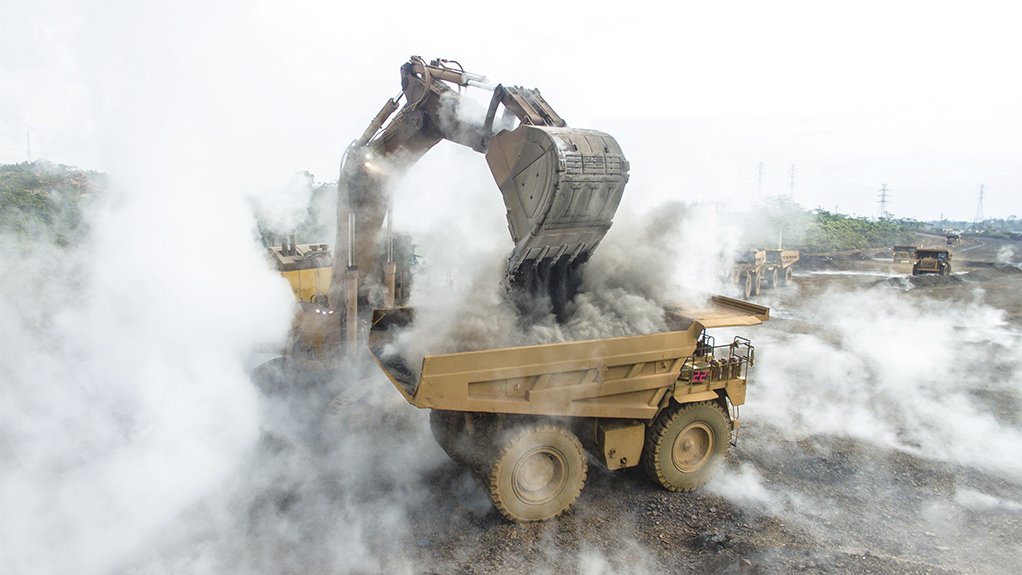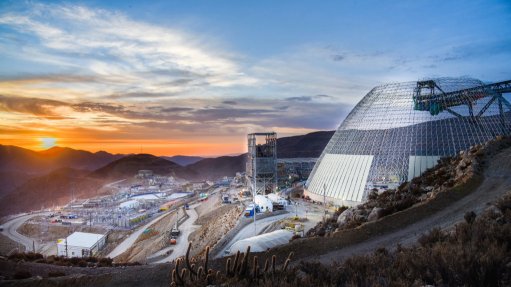35% of mining CEOs feel exposed to climate-related risks
More than one-third – about 4 000, or 35% – of mining CEOs polled by PwC for its latest global mining report consider their company to be highly or extremely exposed to climate-related risks within the next five years.
The global drive to reduce carbon emissions notwithstanding, this year’s ‘Mine 2023: The era of reinvention’ report – the twentieth edition of the global report – found that the geopolitical instability of last year resulted in surging demand for coal, making coal the largest contributor to the top 40 mining companies' overall revenue at 28%. This is the first time that coal has been at the top of the list since 2010.
Despite the continued demand for coal, however, the drive to transition global society to more sustainable energy sources is resulting in the most significant development that the sector has witnessed in decades – the era of critical minerals.
Although demand for critical minerals is rising rapidly, these minerals – other than copper – accounted for only a small share of the top 40 companies’ overall revenue for 2022, with increasing production volumes but volatile prices.
Spending on the search for critical minerals such as copper, lithium and cobalt grew significantly last year, although PwC expects the total exploration spending to decline this year as earnings soften.
In this more dynamic and intensely competitive environment, PwC’s report asserts that miners can no longer rely on the portfolios and methods of the past to generate value.
One shift that PwC believes demands a response is the emergence of government as an important new category of player in the critical minerals market.
“After seeing rapid demand growth and risky levels of supply chain concentration, governments around the globe have formed alliances, instituted new policies and mobilised funding to secure access to critical minerals. These moves are expected to change the mining business,” PwC Africa energy, utilities and resources leader Andries Rossouw said during a presentation of findings in the report on June 7.
He said the inflow of public funds, for example, meant that miners would need to rethink the rates of return they could expect on mining or supply chain assets. Mining companies would also need to contend with heightened investment risk and greater competition, as governments altered the playing field with incentives and interventions.
The mine report has shown that government action in the critical minerals space has taken on three forms.
Firstly, there are an increasing number of government-to-government strategic partnerships or trade agreements centred on critical minerals collaboration.
Secondly, new laws, policies or regulations are being created and enacted to protect, secure or drive growth in critical minerals and supply chains.
Lastly, direct government funding or government-backed funds are being provided to finance ventures in critical minerals and their supply chains.
The result of governments entering the market is that there will be a greater demand for critical minerals, which will alter the financial picture, increasing investment risk and driving competition to new heights. In addition, increasingly stringent environmental standards will be imposed on miners owing to the public sector’s involvement.
PwC’s report shows that critical minerals transactions dominated deal activity last year, as both large and small mining companies raced to reposition themselves for the energy transition.
As a result, the value of critical minerals deals increased by 151% from 2021, accounting for 66% of all deal value in 2022. Copper was the year’s “hottest” commodity, representing 85% of all critical minerals transactions.
However, PwC energy, utilities and resources south market tax leader Laetitia Le Roux highlighted that, even as the global mining industry strived to increase output of critical minerals to support the energy transition, mining company leaders were keenly aware that they must reduce their carbon emissions to avoid risks such as market barriers, fines and loss of social licence to operate.
She pointed out that, of those CEOs who were polled in PwC’s twenty-sixth ‘Annual Global CEO Survey’, 41% said they did not think their companies would be economically viable in ten years’ time if they continued on their current path without reinventing themselves and adapting to the new era of critical minerals.
Le Roux noted, however, that decarbonisation was not necessarily a threat, but that it presented an opportunity for mining companies to create value. By accelerating their decarbonisation plans and extending them to their supply chains, Rossouw noted that mining companies could realise cost savings, partnership opportunities and more favourable financing terms.
The most cost-efficient options for decarbonisation in the industry include direct electrification, efficiency improvement and renewable energy, followed by hydrogen power for applications that cannot be electrified.
However, production of critical minerals would have to increase to meet the growing demand for this energy transition, as achieving global emission reduction targets will require more mining products.
Notably, steel, copper and lithium were highlighted as being most crucial.
Overall, the PwC’s outlook for this year is somewhat mixed, particularly with respect to the top 40 mining companies.
Le Roux said PwC expected to see softening prices for many key mining commodities. However, the 2022 trend of rising costs was expected to stabilise throughout this year, as lower shipping and fuel costs offset some inflation pressures.
Overall capital spending would also decline, although spending on critical minerals and decarbonisation should increase, she said.
Comments
Press Office
Announcements
What's On
Subscribe to improve your user experience...
Option 1 (equivalent of R125 a month):
Receive a weekly copy of Creamer Media's Engineering News & Mining Weekly magazine
(print copy for those in South Africa and e-magazine for those outside of South Africa)
Receive daily email newsletters
Access to full search results
Access archive of magazine back copies
Access to Projects in Progress
Access to ONE Research Report of your choice in PDF format
Option 2 (equivalent of R375 a month):
All benefits from Option 1
PLUS
Access to Creamer Media's Research Channel Africa for ALL Research Reports, in PDF format, on various industrial and mining sectors
including Electricity; Water; Energy Transition; Hydrogen; Roads, Rail and Ports; Coal; Gold; Platinum; Battery Metals; etc.
Already a subscriber?
Forgotten your password?
Receive weekly copy of Creamer Media's Engineering News & Mining Weekly magazine (print copy for those in South Africa and e-magazine for those outside of South Africa)
➕
Recieve daily email newsletters
➕
Access to full search results
➕
Access archive of magazine back copies
➕
Access to Projects in Progress
➕
Access to ONE Research Report of your choice in PDF format
RESEARCH CHANNEL AFRICA
R4500 (equivalent of R375 a month)
SUBSCRIBEAll benefits from Option 1
➕
Access to Creamer Media's Research Channel Africa for ALL Research Reports on various industrial and mining sectors, in PDF format, including on:
Electricity
➕
Water
➕
Energy Transition
➕
Hydrogen
➕
Roads, Rail and Ports
➕
Coal
➕
Gold
➕
Platinum
➕
Battery Metals
➕
etc.
Receive all benefits from Option 1 or Option 2 delivered to numerous people at your company
➕
Multiple User names and Passwords for simultaneous log-ins
➕
Intranet integration access to all in your organisation



















